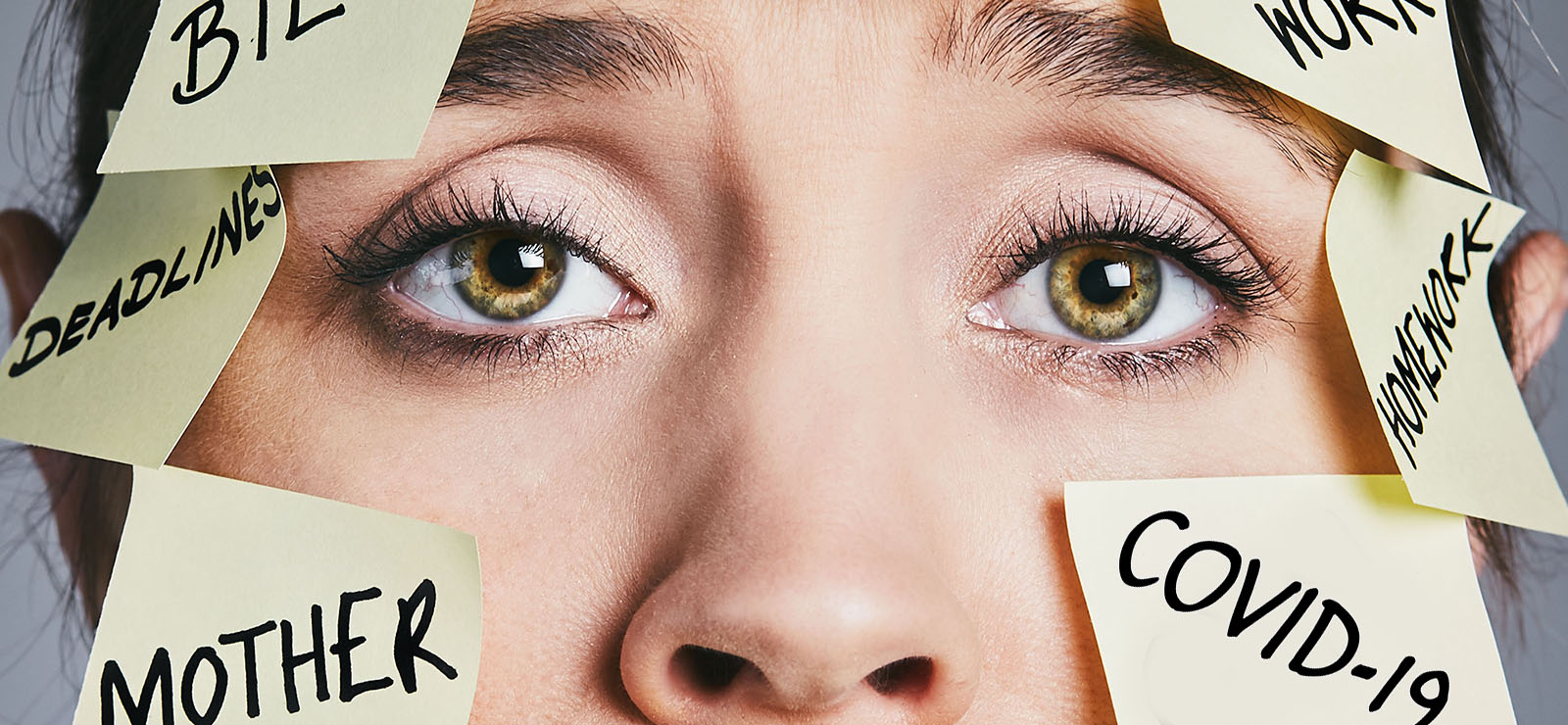By: Amy Braddock, MD, Family Medicine Provider
September 11, 2020

It’s just another ordinary day at work when you feel a migraine coming on. You see flashing spots, which make it hard to focus on tasks. You try to push through the day, but you’re certain it’s getting worse. Instant panic sets in as you turn to Google for answers. Is it a tumor? A stroke? Are you going blind? You decide it’s best to schedule an appointment with your doctor to figure things out.

Your doctor walks in, and you prepare for the life-changing news you’re sure is coming. After ruling out the most common and concerning causing of your ailments, she determines the cause of all of this uncertainty is…
“Stress,” she says.
That’s it? The reason you’re experiencing strange symptoms is just from being stressed? That can’t be right. You weren’t even feeling stressed when it happened. So, what’s the deal?
According to Dr. Braddock, a family medicine doctor at MU Health Care, it’s easy to take on a lot of stress without realizing how much it impacts your health.
“In our current climate, with COVID-19 on everyone’s minds, I’d say about 80% of my patients are impacted by the added stress,” she said. “There are several symptoms and many medical conditions that can be caused or worsened by stress, and right now most of us are stressed to the max.”
Strange Symptoms Caused by Stress
- Pain response: Feeling stressed or anxious affects the way you perceive pain. It increases the level of pain, making symptoms feel even worse than they normally would. Why is this? Stress affects our nervous system, causing us to feel tense. When our muscles are tense for a long period of time, it can lead to painful muscle spasms. Essentially, the stress is causing you even more pain, which creates more stress. Stress also increases anxiety and depression, which worsen perception of pain.
- Skin conditions: When we get anxious, our body secretes oil that can clog our pores, leaving us with unwanted skin issues. If you notice that your skin is breaking out with acne, it could be happening because of stress. Stress can also manifest itself in the form of hives and other skin rashes or make existing skin problems such as psoriasis, rosacea and eczema worse. Not to add another vicious cycle into the mix, but insecurity about these skin issues may add an extra layer of stress.
- Hair color: You’ve heard people joke that their kids are giving them gray hair, but there is some validity to that. Genes do play a large role in when your hair turns gray, but stress can also play a part by affecting the stem cells responsible for regenerating your hair pigment. These stem cells gradually disappear as we age, but stress can accelerate the process. When those stem cells leave the hair follicles, you’re left with gray strands.
- Fertility: There are several factors that affect your fertility, but stress can make it more difficult to get pregnant. Poor diet and excess weight gain from stress can cause your hormones to fluctuate, increasing the likelihood of polycystic ovary syndrome (PCOS), a hormonal disorder that causes irregular cycles that can affect fertility. Stress can affect the fertility of men, too, by decreasing their sperm count and causing erectile dysfunction.
- Digestive issues: If you are experiencing pain and bloating in your abdomen, it could be the result of stress or anxiety. Stress also reduces the blood flow to your gut, making digestion more difficult. It’s also common for people to develop ulcers — open sores in the intestine — resulting in extreme pain and sometimes bleeding. There are two types of ulcers: peptic and stress ulcers. Peptic ulcers emerge on the lining of the stomach gradually because of changes to the stomach’s acidic environment. Stress increases the amount of stomach acid you produce, making peptic ulcers more painful.
- Weight gain: Weight can fluctuate for a number of reasons, but if you notice the scale is going up despite your best efforts to diet or exercise, it could be a result of stress. If you have been feeling overwhelmed, your body may be in fight-or-flight mode, causing an increase in cortisol levels, or stress hormones. Cortisol increases sugars in the bloodstream which can have an effect on your metabolism. Stress can also lead to insulin resistance, which increases blood sugar levels, putting you at risk for developing diabetes. It’s also common to overeat or exercise less when you’re feeling stressed, which can add unwanted weight gain if done too often.
Managing your stress is important for both your mental and physical health. Dr. Braddock shares her go-to tips for managing and reducing stress.
- Exercise: Get at least 10-30 minutes of activity outside daily. Sunlight and fresh air can do a world of good to boost endorphins, reset your focus and minimize stress. Aim for 150 minutes of moderate exercise (such as walking or gardening), or 75 minutes of vigorous exercise (such as running) per week.
- Meditate: There are several apps that offer guided meditations, yoga practices or calming routines to include in your day.
- Practice self-care: Take some time each day — it can be as little as 10 minutes — to let go of all of your other obligations and do something that’s just for you.
- Eat well: Fill your cupboards with nutrient-dense foods that give you energy versus sugary treats that come with a crash. When you are at the grocery store, make a conscious decision to not buy unhealthy foods or soda and instead buy fruits, vegetables and other healthy foods you actually like.
- Avoid dependencies: It can feel really great to unwind after a long day with a glass of wine or another drink of choice, but take a step back if you consistently find yourself having several drinks to relax. Do NOT smoke. If you have previously smoked and quit, it may be tempting to start again to try to reduce stress, but it will hurt you much more in the long run.
- Sleep: Make sure you are getting enough sleep. Avoid late-night screen time and stop your caffeine intake four to six hours before bed.
- Accept your situation: Check in with yourself every once in a while, and let go of what you can’t control. Know that most people are having a hard time right now and that’s okay. Give yourself a break if you’re not the world’s best parent or partner right now. We’re all just trying to do our best.
Next Steps and Useful Resources
- Meet Amy Braddock, MD, Family Medicine Provider


